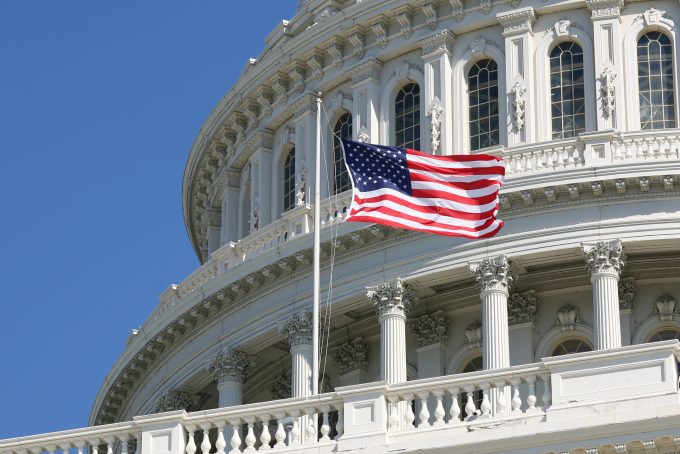New FMC regulation rules out carrier 'lame excuses' for rolling cargo
The days of “lame excuses” being offered by ocean carriers for refusing to carry contracted ...
TFII: SOLID AS USUALMAERSK: WEAKENINGF: FALLING OFF A CLIFFAAPL: 'BOTTLENECK IN MAINLAND CHINA'AAPL: CHINA TRENDSDHL: GROWTH CAPEXR: ANOTHER SOLID DELIVERYMFT: HERE COMES THE FALLDSV: LOOK AT SCHENKER PERFORMANCEUPS: A WAVE OF DOWNGRADES DSV: BARGAIN BINKNX: EARNINGS OUTODFL: RISING AND FALLING AND THEN RISING
TFII: SOLID AS USUALMAERSK: WEAKENINGF: FALLING OFF A CLIFFAAPL: 'BOTTLENECK IN MAINLAND CHINA'AAPL: CHINA TRENDSDHL: GROWTH CAPEXR: ANOTHER SOLID DELIVERYMFT: HERE COMES THE FALLDSV: LOOK AT SCHENKER PERFORMANCEUPS: A WAVE OF DOWNGRADES DSV: BARGAIN BINKNX: EARNINGS OUTODFL: RISING AND FALLING AND THEN RISING

Washington is keeping its funding tap running, in line with supply chain study recommendations.
The administration has announced a $450m grant package to battle congestion at ports after a study on supply chain vulnerabilities called for more action in this vein.
Washington’s spend on marine infrastructure funding is nearly double last year’s grants in the federal Ports Infrastructure Development Programme.
Ports have until 16 May to submit applications for money for projects to boost capacity and improve the flow of goods and comply with the administration’s goals on issues like climate change, racial and gender equity and policies to promote domestic building and buying.
Awards are expected to be announced in the autumn. Ports across the spectrum are eligible and a quarter of the money is reserved for smaller ports.
There should be more such rounds of funding on the horizon, judging from a supply chain vulnerability report unveiled last week by the Department of Transportation. The 140-page report, prompted by an executive order from President Biden a year ago, has 62 policy recommendations to cope with current problems and issues that may arise in future.
“This report lays out critically important steps we can take – both right now and in the years ahead – to help strengthen our supply chains, create good-paying jobs and ensure that Americans can affordably and efficiently access the goods they rely on,” said transportation secretary Pete Buttigieg.
One element the authors stress is the need for infrastructure investment, which resulted in nine recommendations. Governance is another major area highlighted, from facilitating changes in procedures like a shift to 24/7 operations, to steps to curb unfair practices.
The report calls for more powers for the Federal Maritime Commission (FMC) to protect shippers and consumers from such practices. It endorses recent steps by the FMC to address questions of ocean carrier market control and champions the commission’s ability to review carrier alliances to prevent them from reducing service, increasing cost or substantially reduce competition. In light of strong support for such proposals in legislation in both chambers of Congress, these moves will likely find favour in the administration.
The report also calls for more governance in trucking. To help retain and attract more drivers, it suggests the elimination of the exemption of motor carriers from the Fair Labour Standards Act, which frees employers from the requirement to pay overtime. The authors also recommend the establishment of a pilot programme for drivers aged 18-21 that leverages registered apprenticeships to ensure safety and high driving standards.
Another recommendation calls for the government to support state transport departments as well as the private sector to expand truck parking. This includes assistance in project development and research on the impact of truck parking on transport efficiency and road safety.
The paper also calls for more research into supply chain performance and for technical assistance to support planning and co-ordination of freight investments and operations.
One element likely to find broad support is a call for the development of a national freight portal. This should enable stakeholders to share key data and set an “electronic information exchange standard for critical product flow tracking”.
As well as functioning as a data interface tool, the portal could be used as a public database, a dashboard or a website and could serve as a nationwide port community system. It could act as a conduit for real-time visibility into supply chain capacity and provide connectivity across stakeholders.
Calls for a national freight portal have been on the increase over the past year, which prompted the FMC to hold a series of meetings to examine how data are shared across the ocean supply chain. At one such recent hearing, executives from Amazon and FedEx argued that the lack of consistent, uniform data resulted in inefficiencies and raised costs.
The federal government is seen as best-positioned to move on this project, partly because of its ability to establish standards, but also because it could leverage shipment data captured through the automated customs entry system.
Washington seems well poised to play an active role in supply chain matters for some time to come.
Comment on this article